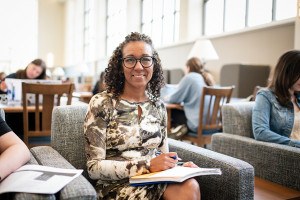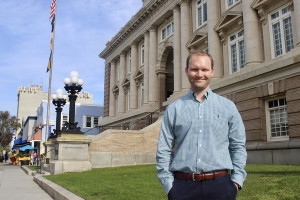How This Villanova Grad Is Fighting Undiagnosed Disease

Photo Credit: Getty Images
Statistics can be an intimidating topic for some, but for Nadea Leavitt, taking an undergraduate course at Villanova University on the topic taught her just how far-reaching its application can be. She then chose to earn her Master’s in Applied Statistics at Villanova, which forged the path to her career as a predictive healthcare analyst at IQVIA, a multinational healthcare information technology corporation with Philadelphia-area offices in Plymouth Meeting and Collegeville.
According to Nadea, half of the more than 7,000 rare diseases we know of today are initially misdiagnosed. As U.S. Lead of Predictive Analytics, it’s her job to correct those mistakes. When it comes to many debilitating diseases, her work is monumental — the lead time for a proper diagnosis can often be seven years or more, which is time someone suffering from a progressive disease doesn’t have.
Below, we talk to Nadea about what her day-to-day as a lead analyst looks like, and how her undergraduate and graduate experience at Villanova’s College of Liberal Arts and Sciences helped lead her here.
What do you enjoy most about your job?
I enjoy the variety of intellectual challenges my job offers me. One moment, I need to work with our data scientists to think through and solve a complex methodological concept, and another moment I need to explain the results of our research in non-technical language to someone who did not learn any statistics since high school.

Villanova alumna Nadea Leavitt ’12 CLAS, ’15 MS, U.S. Lead of Predictive Analytics with IQVIA
How did you go from taking a course in statistics to earning a graduate degree on the topic?
The course I took during my sophomore year demonstrated how diverse and far-reaching the applications of statistics were. That summer I had an internship at a pharmaceutical company in the Philly area, where I first worked with statistics in the healthcare industry—I knew then that I wanted to pursue a graduate degree in Applied Statistics at Villanova. After I earned my undergraduate degree in Economics, I got a job at IQVIA (formerly IMS Health). The following year I returned to Villanova to pursue my master’s in the evenings.
What was your experience working full-time while obtaining your degree?
Juggling work and school was not an easy task, and both could be quite demanding. However, I found that doing them in parallel allowed me to test my newly acquired knowledge in the work environment in near real-time, which proved to be very valuable. I worked with many wonderful professors, including Graduate Director Jesse Frey, PhD, and especially Joseph Pigeon, PhD, who taught my first statistics class and helped me throughout my undergraduate and graduate career.
Can you talk about some of your favorite courses and how they helped you advance your career?
I enjoyed Statistical Methods, as it gave me a solid foundation for future studies; Clinical Trial, as it provided a good understanding of how clinical trials are set up — which is such a big part of what IQVIA does; and Regression and Data Mining, because these two classes first introduced me to predictive analytics.
After I earned my master’s, I started looking for opportunities to better channel my knowledge and ideas about countless applications of predictive analytics to what IQVIA does. At that time, the company was forming a new predictive analytics team, which I soon joined—I became the first employee in the U.S. in this division!
Do you keep in touch with fellow Villanova alumni and professors?
Absolutely! I met some of my closest friends during my time at Villanova. Many of them are still in the Philadelphia area, others are in other places in the U.S. or the world, but we still keep in touch and try our best to make our travel paths cross for mini-reunions. Being in the area, I am able to have casual conversations with my professors or even meet them for lunch. And, the University offers many opportunities for alumni to get together—I try my best to attend those events.
Can you talk about the impact Villanova has had on your life?
Through its diverse curriculum, Villanova gave me an opportunity to first find and later pursue my interests and my passion. It also introduced me to so many of my closest friends. For both of these reasons, I am very grateful!
For more information on Villanova’s Graduate Programs in Mathematics and Applied Statistics in the College of Liberal Arts and Sciences, visit villanova.edu.
This is a paid partnership between Villanova University College of Liberal Arts and Sciences and Philadelphia Magazine

